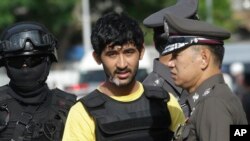Thai police say one of the men arrested in connection with last month's Bangkok shrine bombing has provided more details about his alleged involvement in the attack.
The suspect, Yusufu Mieraili, has admitted to handing a backpack containing a bomb to another man, who is believed to have left it at the shrine, moments before the blast.
That is according to Thai police, who on Wednesday led Mieraili on a public reenactment of his alleged activities on August 17, the day of the blast, which killed 20 people.
"This is the area where he met with the yellow-shirt man to exchange the backpack," said police spokesman Prawut Thavornsiri, speaking outside a Bangkok train station.
Security footage showed a shaggy-haired, slender young man in a yellow shirt leave a backpack near the shrine and calmly walk away, just before the massive explosion.
Police say the two suspects parted ways after the exchange was made.
Another foreigner, identified as Adem Karadak, is also in custody in connection with the case. But their roles in the bombing are not clear.
Officials have said that Mieraili's DNA was found in a Bangkok apartment where bomb-making materials were seized. They also say he has confessed to playing a major role in the attack.
Investigators have not commented on the nationality of the two foreigners, but Mieraili had a Chinese passport that identifies his place of birth as Xinjiang, home to China's Uighur minority group.
Thai media reports have openly drawn a possible link between the bombing and Thailand's deportation in July of more than 100 ethnic Uighurs. Following their forcible return to China, violent protests in Istanbul targeted the Thai and Chinese missions.
The Erawan Shrine is especially popular with Chinese tourists, feeding the speculation it could have been targeted by people who believe the Uighurs are oppressed by Beijing.
Thai officials have been reluctant to label the incident an act of terrorism, for fear it could hurt the country's important tourism industry.




